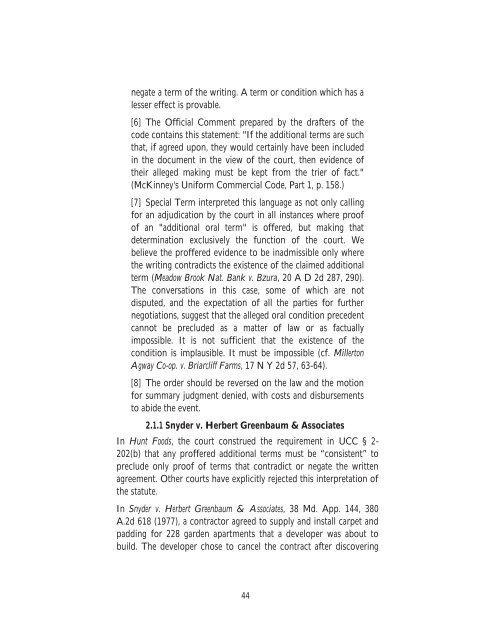Contract Doctrine, Theory & Practice Volume 3, 2012a
Contract Doctrine, Theory & Practice Volume 3, 2012a
Contract Doctrine, Theory & Practice Volume 3, 2012a
You also want an ePaper? Increase the reach of your titles
YUMPU automatically turns print PDFs into web optimized ePapers that Google loves.
negate a term of the writing. A term or condition which has a<br />
lesser effect is provable.<br />
[6] The Official Comment prepared by the drafters of the<br />
code contains this statement: "If the additional terms are such<br />
that, if agreed upon, they would certainly have been included<br />
in the document in the view of the court, then evidence of<br />
their alleged making must be kept from the trier of fact."<br />
(McKinney's Uniform Commercial Code, Part 1, p. 158.)<br />
[7] Special Term interpreted this language as not only calling<br />
for an adjudication by the court in all instances where proof<br />
of an "additional oral term" is offered, but making that<br />
determination exclusively the function of the court. We<br />
believe the proffered evidence to be inadmissible only where<br />
the writing contradicts the existence of the claimed additional<br />
term (Meadow Brook Nat. Bank v. Bzura, 20 A D 2d 287, 290).<br />
The conversations in this case, some of which are not<br />
disputed, and the expectation of all the parties for further<br />
negotiations, suggest that the alleged oral condition precedent<br />
cannot be precluded as a matter of law or as factually<br />
impossible. It is not sufficient that the existence of the<br />
condition is implausible. It must be impossible (cf. Millerton<br />
Agway Co-op. v. Briarcliff Farms, 17 N Y 2d 57, 63-64).<br />
[8] The order should be reversed on the law and the motion<br />
for summary judgment denied, with costs and disbursements<br />
to abide the event.<br />
2.1.1 Snyder v. Herbert Greenbaum & Associates<br />
In Hunt Foods, the court construed the requirement in UCC § 2-<br />
202(b) that any proffered additional terms must be “consistent” to<br />
preclude only proof of terms that contradict or negate the written<br />
agreement. Other courts have explicitly rejected this interpretation of<br />
the statute.<br />
In Snyder v. Herbert Greenbaum & Associates, 38 Md. App. 144, 380<br />
A.2d 618 (1977), a contractor agreed to supply and install carpet and<br />
padding for 228 garden apartments that a developer was about to<br />
build. The developer chose to cancel the contract after discovering<br />
44


















